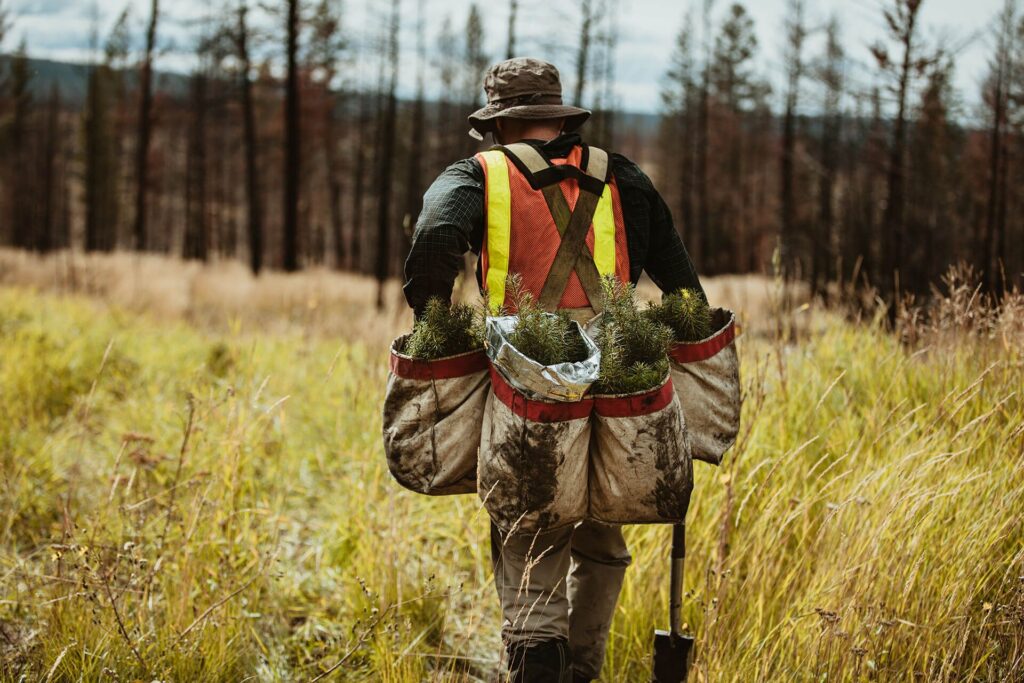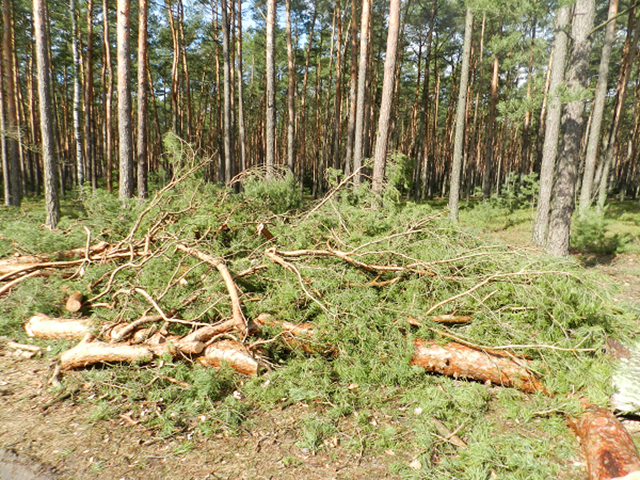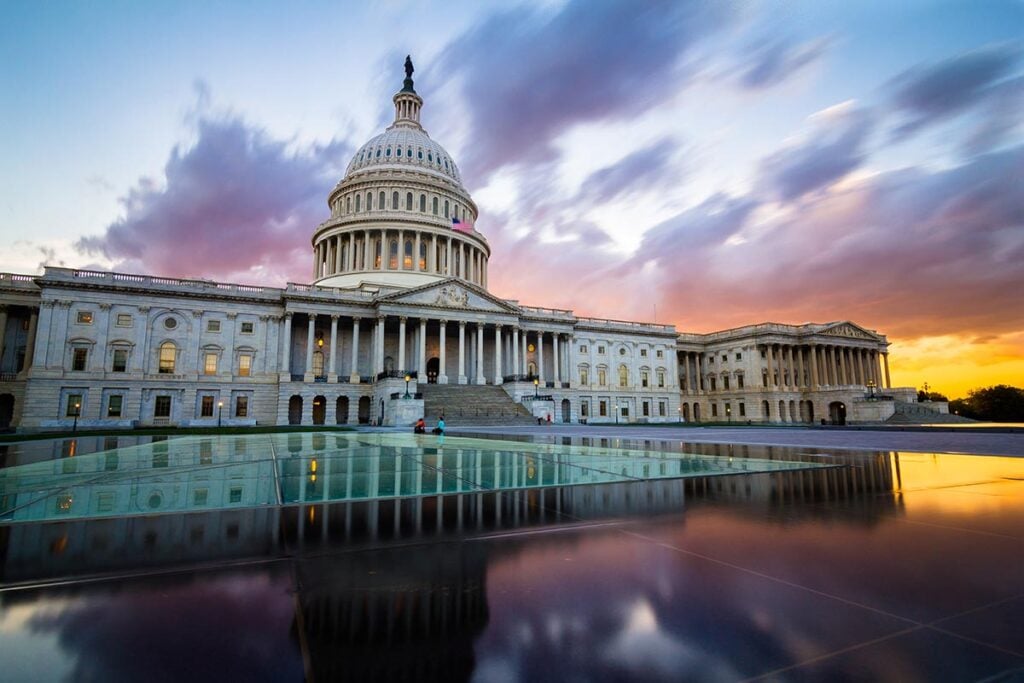
Building Public Policy Engagement in 2022
FRA’s Strategic Plan identifies several key priorities for its advocacy on behalf of the industries we serve.
FRA provides an effective member voice in Washington, D.C., defending against threatening legislation and regulation while advancing public policies that support industry sustainability.
FRA’s Strategic Plan identifies several key public policy priorities for its advocacy on behalf of the forest products industry we serve. Our multi-faceted efforts in 2022 targeted those legislative and regulatory priorities.
H-2B Guest Worker Visas

FY2022 set another record year as overall demand increased nearly 20 percent over the fiscal year 2021. In addition, the first half of visas for FY2022, which most forestry visas requested, was hit sooner than any other year since the visa program was enacted. This left many employers of H-2B forestry without the required number of employees to meet forestry work demands. Some actions FRA took to improve the near-term situation are as follows:
- Included discretionary language in the final spending bill for FY2022. This language allowed the Department of Homeland Security (DHS) and Department of Labor (DOL) to allocate a record amount of 66,000 supplemental H-2B visas.
- FRA continued to meet with Congressional members urging them to support the Returning Workers Exception Act and the H-2B Forestry Worker Exemption Act. These bills provide meaningful H-2B visa relief to the cap of 66,000. FRA expects both pieces of legislation to be introduced in the 118th Congress.
- FRA worked with Congresswoman Salazar (R-FL-27) to have language in the Dignity Act be re-introduced in the 118th Congress to provide a pilot program that would allow employers of H-2B visa forestry workers the option to participate in the uncapped H-2A visa program.
- The H-2B Workforce Coalition Steering Committee (of which FRA is a member) held several meetings with labor union representatives and House and Senate Judiciary Committee staff to come to an agreement on legislation that would provide meaningful cap relief to the H-2B visa program. These talks reached an impasse as labor unions would not agree to a reasonable cap and wanted to ban certain sectors from the H-2B visa program.
- FRA participated in a House and Senate briefing on the difficulties experienced by employers of H-2B forestry workers related to the H-2B visa program.
- FRA led an effort in preparing a House member letter sent to the Secretaries of the DHS and DOL. The letter encouraged the departments to expedite the processing of H-2B visas for forestry workers. The letter conveys the importance of H-2B forestry workers in reforesting public and private forestlands.
- FRA met with Forest Service leadership to discuss the importance of H-2B workers in reforesting Federal Lands and encouraged them to recognize the worker shortage for tree planting in the National Forest System Reforestation Strategy.
Carbon Neutrality of Forest-Based Biomass

- FRA successfully advocated for the inclusion of appropriations language that directs federal agencies to recognize the carbon benefits of forest-based biomass in both the House and the Senate Interior Appropriations bills. This included a successful effort to remove harmful language in the House Interior Appropriations bill that did not recognize forest-based biomass as carbon-neutral.
- FRA continued to work with allied associations to broaden the definition of forest-based biomass to include in-woods produced biomass created during timber harvest operations.
Transportation Research
- FRA continued to build our knowledge base on the transportation front. Research was completed in the Lake States Region that assessed the safety and efficiency benefits of allowing trucks hauling raw forest materials access to the interstate at legal state weights. Research was also completed in the southeast U.S., assessing the increased costs of log truck insurance, and providing recommendations for lowering insurance costs. The research results will be used to build congressional support for public policies to address log truck safety and efficiency.
Regulations

- Independent Contractor Status: FRA submitted comments on the DOL proposed regulations for determining independent contractor status. The proposed regulations, if finalized, would expand the coverage of the Fair Labor Standards Act by treating many individuals who, under current law, would be properly classified as independent contractors as “employees.” FRA urged the DOL to provide a rule that provides more certainty and clarity in determining independent contractor status.
- Bats: FRA submitted comments on the proposed rule to reclassify the northern long-eared bat (NLEB) as an endangered species under the Endangered Species Act (ESA). The NLEB range extends across 37 states and is currently listed as threatened with an accompanying 4(d) rule that allows forest management operations to proceed if conservation measures are followed. FRA encouraged the United States Fish and Wildlife Service (USFWS) to recognize that White Nose Syndrome is the primary cause of the NLEB population decline, and that well-managed forests provide habitat and the landscape scale necessary for the survival and recovery of the NLEB species. Similar comments were submitted for the proposed listing of the tricolored bat – whose range extends across 39 states – as endangered under the ESA. FRA has additionally met with the USFWS and Forest Service on this issue to minimize impacts to the forest products industry by the endangered listing. FRA continued to work with the Lake States Region on their Bat Habitat Conservation Plans (HCP) to ensure conservation measures in the HCP were reasonable for forest management and logging operations.
- ESA Flexibility Act: FRA has worked with the House Natural Resources Committee’s ranking member’s staff to prepare the ESA Flexibility Act. This legislation currently addresses a U.S. Fish and Wildlife Service (USFWS) proposed rule to reclassify the northern long-eared bat from being threatened to being endangered under the ESA. The Flexibility Act would allow forest and timber operations to continue as they do now under the 4(d) rule when the NLEB is listed as endangered.
- Old Growth and Mature Forest Designation of Federal Lands: FRA submitted comments on the United States Department of Agriculture (USDA) Forest Service Request for Information (RFI) that sought public comment on mature and old-growth forest definitions. The RFI was in response to President Biden’s Executive Order (E.O.) that directs the agency to inventory and define mature and old-growth forests. FRA encouraged the agency to consider the long-term implications of creating a policy that reserves additional forest land from management.
- WOTUS: FRA joined the American Forest and Paper Association (AF&PA) and the National Alliance of Forest Owners (NAFO) in filing an amicus brief with the U.S. Supreme Court regarding the federal authority to designate Waters of the U.S. (WOTUS). The amicus brief supports a lawsuit challenging the authority of the federal government under the Clean Water Act to decide what qualifies for federal protection. It supports the idea that the federal government takes a much narrower approach and allows states to retain their traditional role as the primary regulators of land and water resources.
- OSHA Heat Standard: FRA provided comments on the Notice of Proposed Rulemaking on Heat Injury and Illness Prevention in Outdoor and Indoor Work Settings. The proposal sought information on what to consider in a national rule employers would need to follow to address heat-related illness prevention on the worksite. FRA urged the Occupational Safety and Health Administration (OSHA) to recognize that the states are in the best position to determine whether any heat standard is needed in response to the specific weather and workplace conditions that exist in that state.
Federal Lands
- FRA participated in a panel that provided information about the opportunities and challenges the USDA-Forest Service will have in implementing the Wildfire Crisis Management Plan. FRA stressed the importance of the Forest Service working with the existing forest industry workforce to treat acres efficiently and effectively in need of fuel reduction and management.
- FRA additionally served on the Wildfire Crisis Roundtable to develop a strategy to manage the wildfire crisis on Federal lands.
- FRA met with Forest Service Chief Randy Moore to discuss how the forest products industry could best assist the Forest Service in meeting wildfire mitigation goals, forest-based biomass, regional timber programs, and old-growth and mature forest policy.
- FRA is participating in a workgroup with the Forest Service Chief’s office to provide comments on the administration’s directive to inventory and protect old-growth and mature forests on federal lands.
Inflation Reduction Act
FRA was active in successfully defeating many of the proposed revenue raisers in the Build Back Better legislation – the precursor to the Inflation Reduction Act – that passed the House, which would have negatively impacted medium-sized businesses. These proposed revenue raisers included eliminating stepped-up basis, which is a provision in the tax code that allows the basis (or initial value) of an asset to be reset to its fair market value upon inheritance, thus eliminating capital gains tax owed as assets are passed from generation to generation. There were a number of other proposed taxes that would have negatively affected S-Corporations, which FRA successfully opposed.
Roundtables
FRA was asked to participate in two roundtables to discuss forestry issues hosted by the Congressional Western Caucus and House Natural Resources Ranking Member, Congressman Bruce Westerman (R-AR-4). FRA presented a comprehensive report of issues affecting the wood supply chain.
World Forestry Center Conference
FRA organized and participated on a panel at the World Forestry Center Conference: “Who Will Own the Forest?” The FRA panel presented information on the supply chain challenges of the forest products industry.
FRA looks forward to working with the 118th Congress to advance our member’s policy priorities and advocate for our policy initiatives in 2023.
FRA Priorities for the 118th Congress
- Transportation: Inform legislators on the importance of a safe and efficient transportation system to the wood supply chain. Work with allied associations to implement policies that improve access to truck drivers.
- Forest-Based Biomass: Ensure that federal regulatory agencies continue to recognize the carbon neutrality of forest-based biomass for energy production.
- H-2B Guest Workers: Continue to work towards permanent cap relief for H-2B forestry workers to address the backlog of acres needing reforestation on private and public lands.
- Endangered Species: Provide comments on the proposed listed species that will impact the wood supply chain. Work with USFWS to minimize impacts listed species may have on our member businesses.
- Farm Bill: Seek members’ support of our priorities to include in the 2023 Farm Bill. These include forestry workforce, innovative wood products, biomass, and Forest Inventory Analysis program funding.
- Federal Land Management: Assure the Forest Service timber program provides a reliable and predictable supply of timber.
- Grassroots: Include FRA members in targeted grassroots efforts to further FRA policy priorities. Develop guidelines for and assist FRA members in hosting congressional visits at their facilities or in-woods visits.